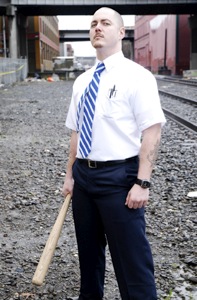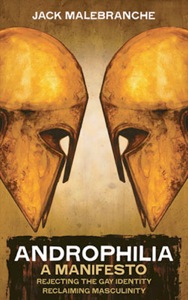Arts & Entertainment
Review: ‘Androphilia’ reclaims the masculine identity
Published Thursday, 08-Nov-2007 in issue 1037
“I am not gay.” Jack Malebranche’s first four words hooked me from the start – an epiphany, a rallying call, a simple declarative statement that revoked the emasculating and encapsulating power of the word, “gay.”
As a manifesto, Malebranche’s Androphilia: A Manifesto Rejecting the Gay Identity Reclaiming Masculinity asserts a point of view I’ve long shared which is that despite my personal sexual preferences, I really have very little in common with so-called gay culture – a culture broadcasted, controlled, and encouraged by the Gay Party, a radically leftist group of past counter-cultural rebels who have now congregated into a truly corporate machine, rolling dollar after dollar into special interest legislation bent in one direction, not open to dissent or self-reflection. It’s a party so desperate for normalcy that it ignores the many problems plaguing its own members – a disparate hodgepodge of lesbians, gays, bisexuals, transgender, and myriad other confusing neo-liberal labels too complex and arbitrary to list, a party so hungry for acceptance and inclusion that it consistently seeks approval and acknowledgement from a society that would rather see it disappear.
Androphilia as a concept is a rebuttal of the word gay and everything it connotes and promotes. Per Malebranche, “the word gay describes a whole cultural and political movement that promotes anti-male feminism, victim mentality, and leftist politics … gays stand for the notion that sexuality engenders ethnicity and complete social identity.”
Androphilia, on the other hand, is at once a rejection of the gay identity and its clichéd effeminate stereotype, and reclamation of masculinity via the quest for an authentic masculine identity. Not the uber-queer choose-your-own-form-of-masculine definition, which is often just another way to say effeminate, and not the hyper-masculine invention by leather men and bears which is just another form of drag, but a qualified masculinity based on physical, essential, and cultural elements outlined in the text.
So the book addresses how reclaiming a masculine identity is necessary to counteract the negative and effeminizing forces of modern gay culture. It promotes a masculine ideal of self-reliance, independence, and personal responsibility through achievement, respect, and integrity. Best of all, the author suggests that men should build alliances with other men, including heterosexual men. Androphile men should develop strong relationships with heterosexual men, not just others with the same preference. Because the fact of the matter is, the forces emasculating gay men are doing the same to straight men. If you disagree, think about the political-correctness of metrosexuality and other gender blending in today’s popular culture. The author’s belief is that only through building an alliance with other masculine men will the tide turn in the favor of reclaiming and establishing a masculine identity again, for all men, yet especially for men who love or prefer men – androphiles.
In this age of squalid political correctness, to speak out as a homosexual or androphile against organizations such as the HRC or GLAAD could be equivocated by some as biting the hand that feeds you. However, the named powerful organizations do so little to counteract the negative characteristics and qualities of the loosely knit and contrived communities they represent.
GLAAD glorifies effeminate affectations and representations of gay men as positive developments in the mainstream media. They aren’t. Effeminate gay men on television are like blackface actors in southern theaters during segregation. They do nothing but promote an emasculating stereotype that continues to further weaken gay men in the eyes of heterosexual men. HRC gushes about its achievements in corporations and political campaigns. Each organization touts ephemeral qualities of inclusion, diversity, and the intoxicating idea of equality. Yet anyone who speaks out against either organization out of a sense of pragmatism is castigated, shunned, or patronized for their dissent.
Republican homosexuals are treated as villains. Libertarians are scoffed at. Constitutionalists are trivialized. Anyone who doesn’t agree with a feminist perspective is ridiculed. Masculine-identified men are labeled as internally homophobic. But it is worse than that. The current gay “culture” fosters young adults into a world of designer drugs, materialism, body dysmorphia – bigorexia and anorexia, classism and a plethora of other social maladies.
The community is, in actuality, a disaggregated and forced collection of people who frankly don’t really like each other that much. Nor should they. If you disagree, ask a lesbian how much she really likes going to a circuit party – and perhaps she could take the kids, too! Ask a military officer how comfortable he or she would feel on a Pride float. Proud of what? The GLBT alphabet soup with all of its anti-war Democrats? Or proud of their service to the country, which seems to matter to gays only if you reached veteran status and came out? Online profiles for horny gay men tout list after list of racial, HIV-status, age, money and political preferences. Gay bars are segregated along the same lines. Do we really have that much in common, or are we just pretending to?
The author studies and criticizes the rationale behind the research of Karl Heinrich Ulrichs and his urning theory on homosexuality and argues instead that there should be a more libertarian approach to sexuality, the same approach that resulted in the decriminalization of sodomy laws in the Western world. Greek culture, Roman warriors, and other non-gay forms of male relationships are examined to contrast with the current anti-masculine gay sexuality.
Another critical point in the book is how men who disavow gay culture should also remove themselves from what he believes is a culture of victimization and being the underdog. He asserts that if someone defines themselves by their travails, they will never truly be free of them. Most GLBT people these days haven’t faced that much harassment, if any, so gay culture continues to promote a victim mentality even in those who have never been victims.
Personally, the vindication I feel in reading this book is that finally, finally, another gay man is advocating what I’ve believed for years: the belief that men who admire or love men should be more responsible, not give into the effeminate gay cultural fad, avoid the personal, career, and social pitfalls common to those who live in a completely emasculated world, and build stronger ties with heterosexual men who share common interests.
I agree. I am not gay, either. I’m an androphile.
|
|
Copyright © 2003-2025 Uptown Publications



